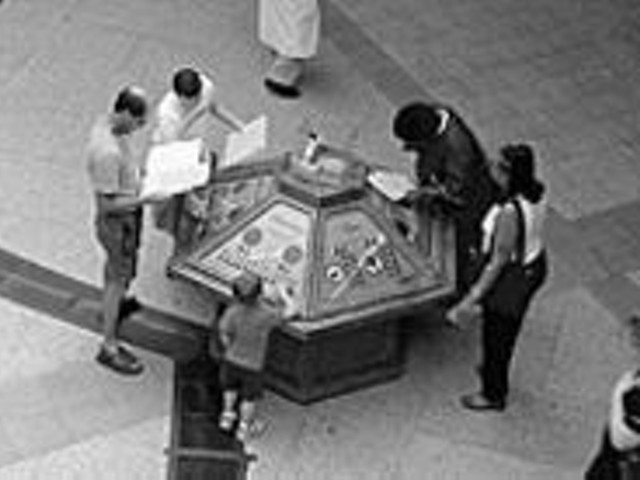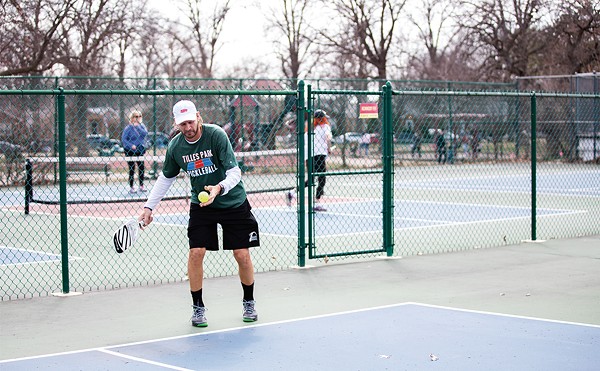With its reliance on cane chairs and umbrellas, the (Mostly) Harmless Theatre production of The Laramie Project bears striking parallels to the more benevolent Our Town. (How fascinating it would be to see these two plays performed in repertory by the same company.) Under the astute direction of Robert Neblett, this docudrama about the October 1998 torture and murder of gay college student Matthew Shepard is laced with haunting elements.
Especially haunting is the string quartet that sits stage right like an impervious Greek chorus. Shepard does not appear in this play, so the quartet sits in for him. As the evening progresses, his heart, his soul, even the agony of his tortuous vigil, are evoked through Adam Rosen's astonishing, and often wrenching, original music. This fusion of action and sound is a wondrous achievement.
Episodic to a fault, The Laramie Project is persuasively performed by ten talented actors who portray scores of roles. The actors provide many touching vignettes. But the problem here -- which lies with neither the actors nor the production -- is simply this: In trying to dissect an entire town, the script is a mile wide and an inch deep. With the exception of one compelling subplot about a police officer who might have been affected by Shepard's HIV-tainted blood, the action doesn't stay with any character or theme long enough for the viewer to grow very involved.
One minute we're voyeuristically learning details about the events leading up to the murder, but don't get too absorbed, because a moment later we're exposed to a searing indictment of the media. Before we have time to ponder that, we briskly move along to something else. By evening's end, I found myself echoing Rosencrantz in Tom Stoppard's Rosencrantz and Guildenstern Are Dead: "Incidents! All we get are incidents! Dear God, is it too much to expect a little sustained action?"
Even more aggravating is the intrusive manner in which the script has been assembled. In the aftermath of Shepard's brutal murder, the Tectonic Theater Project traipsed out from New York City to Laramie to impose itself on the community as it conducted scores of interviews. But then, in shaping this mass of material, the company made the egoistic decision to include itself onstage as part of the action. Their needless presence repeatedly slows the movement to a crawl -- as does that clunky Ken Burns technique of announcing everyone's name before or after he or she speaks.
Compare the self-indulgent, self-aggrandizing Laramie Project and A Chorus Line -- it probably sounds like an arbitrary stretch, but think about it. Each play began as a formless mass of interviews. Yet the Chorus Line transcripts were relentlessly reshaped and distilled until they found an all-new identity. Last week's Muny production was a vibrant reminder that the 1976 Pulitzer Prize-winning musical was no fluke: It possesses something eternal.
Right now, The Laramie Project is the flavor of the month. Well-intentioned theater companies around the country are clamoring to produce it. The theme sounds so important: Of course we need to be reminded about the plague of homophobia. But it's also worthwhile to heed the words of David Mamet: "People have tried for centuries to use drama to influence and change people's lives. It doesn't work. It might be nice if it did, but it doesn't. The only thing the dramatic form is good for is telling a story." Despite the fact that the (Mostly) Harmless Theatre has bent over backward to mount an outstanding production, Matthew Shepard's story deserves a more humble, and a much more focused, telling than the Tectonic Theater Project has given it in The Laramie Project.





